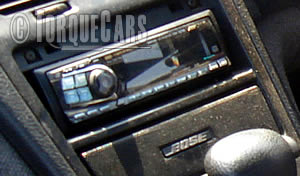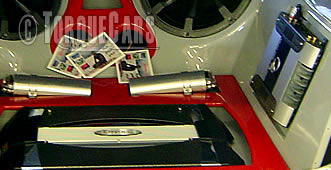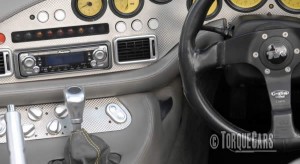Choosing your ICE components
"If it sounds too good - it probably is."

High up on the priority list for many drivers is a good In Car Entertainment (ICE) setup. So which components do you need and what speaker sizes work the best and where do you start planning your ICE setup? This article will deal with the Installation,
We have to give a warning here before we begin. Listening to loud music will cause permanent hearing damage. Conditions from tinitus (constant ringing in the ears) and deafness are attributed to loud music. The damage is cumulative.
So what head unit should you choose?
The head unit is the heart of your ICE system. Functions and options vary greatly. Your first step is to determine what size fits your car.
Some cars have custom head units that are built into the dash. There are a few aftermarket head units around to fit the original OEM shape but an easier option is to use an adapter or blanking plate to reduce this to the standard DIN size.
A few cars have a double height or double DIN slot and these can take more complex car radios with many more features. It is not unusual to see a DVD player and SAT nav being offered in head units.
Here are some things to think about when it comes to choosing a spec.
You will also need to decide what to listen to. Do you need an IPOD dock or a USB interface for a portable media player. Will you be playing CD's and do you need one that can read an MP3 or WMA file disc. Will you need to play back DVD's and is a built in Sat nav important to you? Do you need to pick up DAB transmissions?
CD changers are handy ideas but in reality having to shuffle through a set of CD's is a bit of a pain, especially when an MP3 CD can contain so many tracks. Also having a lot of original CD's in the car is attractive to thieves, if you added up the cost of each CD it doesn't take long before it becomes worth breaking into your car.
This is your interface to the sound system and is effectively the heart. The better the quality of your speakers the more you will notice a cheap head unit. There is a wide selection around today and we would suggest you get a head unit with the functionality that you need.
Ignore the extras offered and stick with your needs. You will also need to note the outputs offered. If you are using an amplifier you will need a head unit with a line out option and a separate bass feed will make the job easier.
Note the placement of the buttons, are these intuitive? You certainly don't want to be fiddling and trying to read the buttons whilst driving along. Is there an option for a steering wheel remote control stalk to control the options. If your car already has radio controls on the steering wheel you may find that these can be set to work with your new head unit.
Most drivers do not use an amplifier but amps are popular with young drivers who want a lot of loud bass. If you do not have an amplifier then you will need a head unit with a powerful output. Power output of the head unit is not a major factor if you will be getting a separate amp. Power outputs are often quoted in watts. Unfortunately watts are not a good indicator of the end result. RMS (Root Means Square) is a better measurement of the power of the sound. At the end of the day though you really want a setup which can reproduce the entire wide range of frequencies that the human ear can hear.
There really is no substitution for auditioning a head unit wired up to some good speakers.
 AMPS
AMPS
The Amplifiers boost the signal power from the head unit and more effectively drive the speakers. Generally speaker the more power you have the louder your setup. You need to remember that louder is not always better.
The wattage on the amp depends largely on the voltage supplied by the car. A 1000W amp rated to 14.4 volts will only be producing 833W on a 12 volt supply. With the bass turned up and other items running your battery voltage can drop to 11v leaving the amp producing just 769 watts.
Good quality amps tend to have their power ratings based on 12 volts. Cheaper amps will artificially inflate their power by quoting a 14.4 volt supply. You get what you pay for.

Speakers
With some decent quality 6x9's you will get a good range of sound. You will not really notice much of a benefit from having a base speaker (unless you turn up the BASS a lot!)
Bass speakers, however are useful and take a lot of the strain off the regular speakers. This allows you to concentrate on the higher frequencies with the regular speakers, aiding clarity and reproduction and leave the heavy bass work to the dedicated sub woofer.
Avoid Bass tubes, instead get a decent sized base speaker in a good enclosure. If you supply the bass speaker with around 300 watts from a mono amp (low frequencies are not directionally detectable to the human ear so a mono amp is all that is required for this. We have heard some really nice installs without the base speaker.
Many thanks to ASC audio for their input and help with this article. To discuss ICE installs in more detail than this please join us in our forum where we have a dedicated ICE section.
If you liked this page please share it with your friends, drop a link to it in your favourite forum or use the bookmarking options to save it to your social media profile.
Check out TorqueCars new YouTube channel, and see their awesome new content...
Feedback
Please use our forums if you wish to ask a tuning question, and please note we do not sell parts or services, we are just an online magazine.
Help us improve, leave a suggestion or tip
